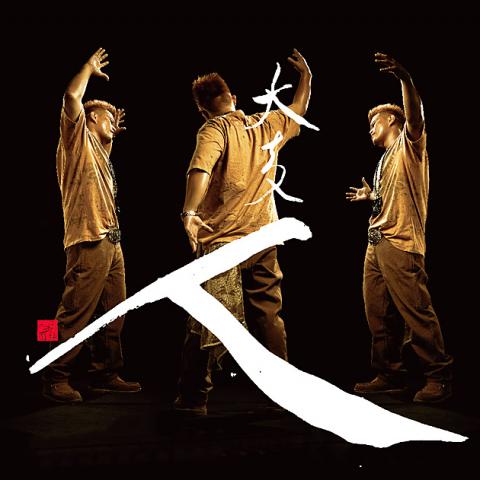Encountering Happiness (遇見快樂)
Winnie Hsin (辛曉琪)
Dream Come True Music

Mando-pop “therapeutic diva” (療傷歌后) Winnie Hsin (辛曉琪) has re-emerged after a five-year hiatus with the quasi-gospel album Encountering Happiness (遇見快樂). Whether eulogizing spiritual tranquility or waxing poetic about happiness, Hsin sings songs that reflect her newfound contentment.
Serving as a producer for the first time, Hsin enlisted A-list songwriters such as Chris Hou (侯志堅) and Ma Yu-fen (馬毓芬) to craft 10 tracks that drive home the message of happiness. The title track, Encountering Happiness, is a mid-tempo, folksy gem that sees Hsin jettisoning the heart-wrenching vocals that marked her early hit ballads such as Awakening (領悟) and Scent (味道) to adopt soothing, laid-back vocals. “Realizing the truth about happiness, I will hold on,” she croons.
Silent Love Song (無聲情歌) pairs Hsin with veteran rocker Chyi Chin (齊秦) in a contagious ballad about mid-life romance. Another highlight is the Bossa Nova gem Leisurely and Carefree (悠由自在) in which she lets loose with flirtatious vocals, revealing a rarely-seen coquettish side.

Hsin’s new album follows in the footsteps of Wan Fang’s (萬芳) Let’s Not Grieve Anymore (我們不要傷心了) from two years ago, with both singers shedding romantic angst and concentrating on affirming emotional bliss.
— ANDREW C.C. HUANG
Mr. Jazz A Song for You

Jam Hsiao (蕭敬騰)
Warner Music
Mando-pop “therapeutic diva” (療傷歌后) Winnie Hsin (辛曉琪) has re-emerged after a five-year hiatus with the quasi-gospel album Encountering Happiness (遇見快樂). Whether eulogizing spiritual tranquility or waxing poetic about happiness, Hsin sings songs that reflect her newfound contentment.
Serving as a producer for the first time, Hsin enlisted A-list songwriters such as Chris Hou (侯志堅) and Ma Yu-fen (馬毓芬) to craft 10 tracks that drive home the message of happiness. The title track, Encountering Happiness, is a mid-tempo, folksy gem that sees Hsin jettisoning the heart-wrenching vocals that marked her early hit ballads such as Awakening (領悟) and Scent (味道) to adopt soothing, laid-back vocals. “Realizing the truth about happiness, I will hold on,” she croons.
Silent Love Song (無聲情歌) pairs Hsin with veteran rocker Chyi Chin (齊秦) in a contagious ballad about mid-life romance. Another highlight is the Bossa Nova gem Leisurely and Carefree (悠由自在) in which she lets loose with flirtatious vocals, revealing a rarely-seen coquettish side.
Hsin’s new album follows in the footsteps of Wan Fang’s (萬芳) Let’s Not Grieve Anymore (我們不要傷心了) from two years ago, with both singers shedding romantic angst and concentrating on affirming emotional bliss.
— ANDREW C.C. HUANG
The People (人)
Dog G (大支)
Uloud Music (有料音樂)
Taiwanese hip-hop is a sounding a little more grown-up these days, judging by this latest album from one of the genre’s leading proponents, Dog G (大支). The Tainan-born rapper, real name Tseng Kuan-jung (曾冠榕), broke onto the scene as the faithful sidekick of the country’s best-known hip-hop artist, MC Hot Dog (熱狗).
When they started over a decade ago, the pair were something of a novelty in Taiwan’s underground music scene, being among the first genuine “local” rappers, as opposed to a revolving door of pretty-boy Chinese Americans from Los Angeles that enter Taiwan’s Mando-pop scene.
On The People (人), Dog G has moved away from the strictly hard-edged beats and youthful bravado of his debut album Lotus from the Tongue (舌粲蓮花, 2002), drawing from an eclectic collection of sounds that range from smooth R’N’B and electro-rock to dub and Taiwanese folk.
The music comes across as more sophisticated, thanks in part to a handful of top-notch collaborators, as well as the fact that Dog G’s already-deft rhyming skills have matured. This time around, he raps more in Mandarin than Hoklo (commonly known as Taiwanese), but his pet subjects remain the same: Taiwanese pride, dissing China and dissing lame rappers.
This would make Freddy Lim (林昶佐), vocalist for death metal band Chthonic (閃靈) and outspoken pro-independence activist, a natural guest collaborator. The Last Song (最後一首歌), a track about overcoming one’s inner demons, is a rousing nu-metal romp on which Lim belts out the fist-pumping chorus with his signature guttural voice.
Bala (芭樂) is a funny diss track in which Dog G apologizes for having made fun of Mando-pop ballads in the past, because it turns out that Taiwanese rappers are “even lamer than love ballad singers” (現在台灣的饒舌歌手比芭樂歌手還要莫名其妙). The song includes lines ridiculing Mando-pop artists/rappers who pepper their rhymes with “Yo” and rap about “stuff that only happens to black people.” MC Hot Dog makes a cameo on this track and adds a pitch-perfect snark to the song’s chorus: “Balalala (literally 芭樂, guava, slang for ‘ballads’). I know I’m just like them, I learned from Dr Dre / We simply aren’t dope / Our dicks are small and short” (芭樂樂樂樂 我知道很像 我就是學Dr Dre 怎樣/芭樂樂樂樂/我們根本不屌/我們的屌都超短超小).
Mando-pop balladeers might fume at Dog G’s smirking diatribes, but what really ought to make them feel inadequate is their inability to produce a track as beautiful as Eternal (不滅). This sparse R’n’B number is carried by female indie rock chanteuse Deserts Chang (張懸), who, frankly, steals the show from Dog G. Her vocal choruses imbue the song with an exquisite, stately touch.
Eternal lifts the album into an ethereal space, while 19470228 takes Taiwanese hip-hop to a higher level. The track features innovative sampling of enka/nakashi music, the mournful ballads that became part of Taiwan’s pop music fabric during the Japanese occupation. The riffs are sublime, as are the old-school style vocal backing tracks sung in Hoklo by Fiona Wu (吳南穎). And if the song title puts you off for fear of yet another rehashing of the 2/28 incident, fear not. The lyrics, which have a poetic touch, could be interpreted about loss in any situation.
Still, those who just want to hear slick anti-China one-liners from Dog G will be satisfied. On B box (蘭芭詞), a smooth dub jam filled with sampled Chinese bamboo flutes, Dog G harps on Taiwanese pop stars who have “China Fever” (中國風). The song’s punchline comes when he sneers at pop stars who refer to China as “neidi” (內地, literally “the interior”), a loaded term that implies that its borders extend overseas to Taiwan: “Interior? Taiwan’s interior is in Nantou!” (內地?台灣的內地是南投!)
— David Chen

May 11 to May 18 The original Taichung Railway Station was long thought to have been completely razed. Opening on May 15, 1905, the one-story wooden structure soon outgrew its purpose and was replaced in 1917 by a grandiose, Western-style station. During construction on the third-generation station in 2017, workers discovered the service pit for the original station’s locomotive depot. A year later, a small wooden building on site was determined by historians to be the first stationmaster’s office, built around 1908. With these findings, the Taichung Railway Station Cultural Park now boasts that it has

Wooden houses wedged between concrete, crumbling brick facades with roofs gaping to the sky, and tiled art deco buildings down narrow alleyways: Taichung Central District’s (中區) aging architecture reveals both the allure and reality of the old downtown. From Indigenous settlement to capital under Qing Dynasty rule through to Japanese colonization, Taichung’s Central District holds a long and layered history. The bygone beauty of its streets once earned it the nickname “Little Kyoto.” Since the late eighties, however, the shifting of economic and government centers westward signaled a gradual decline in the area’s evolving fortunes. With the regeneration of the once

In February of this year the Taipei Times reported on the visit of Lienchiang County Commissioner Wang Chung-ming (王忠銘) of the Chinese Nationalist Party (KMT) and a delegation to a lantern festival in Fuzhou’s Mawei District in Fujian Province. “Today, Mawei and Matsu jointly marked the lantern festival,” Wang was quoted as saying, adding that both sides “being of one people,” is a cause for joy. Wang was passing around a common claim of officials of the People’s Republic of China (PRC) and the PRC’s allies and supporters in Taiwan — KMT and the Taiwan People’s Party — and elsewhere: Taiwan and

Even by the standards of Ukraine’s International Legion, which comprises volunteers from over 55 countries, Han has an unusual backstory. Born in Taichung, he grew up in Costa Rica — then one of Taiwan’s diplomatic allies — where a relative worked for the embassy. After attending an American international high school in San Jose, Costa Rica’s capital, Han — who prefers to use only his given name for OPSEC (operations security) reasons — moved to the US in his teens. He attended Penn State University before returning to Taiwan to work in the semiconductor industry in Kaohsiung, where he